On the German-Dutch border, on the Lower Rhine - in Jülich - fresh kiwi berries for the German food retail industry have been grown for more than seven years. On a total of three acreages (7.8 hectares in total), the dedicated team at Charly's Erdbeerhof, headquartered in Jülich (NRW), is dedicated to the sustainable and product-friendly cultivation of the increasingly popular berry fruit. Due to the steady increase in production volume, the management is considering offering the kiwi berries as a direct marketer in the future, says plant manager Dennis Weisbrod.
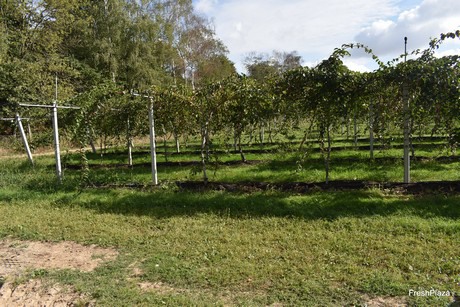
View of the kiwi berry land in Jülich.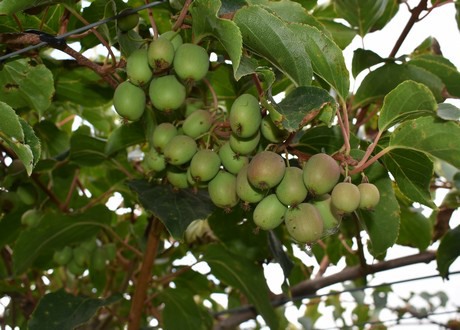
Fresh kiwi berries of the Ananasnaya variety, just before the harvest.
At present, there is a lot of activity on the Jülich cultivation farm, where, in parallel with the short kiwifruit campaign, the last outdoor strawberries of the season are being picked. The cultivation of kiwi berries at that time originated from a purely coincidental idea, it is said. At that time, many Chilean berries arrived in the German market, and thus for the first time encountered the kiwi berry. Dieter Schwerin LLC quickly recognized the potential of berry fruit for its taste and cultivation advantages and imported the first plants of the Ananasnaja variety to Germany, where they were planted on approx. 4.5 hectares. At the moment Jülich already cultivates more than 7 hectares (divided into three individual areas). 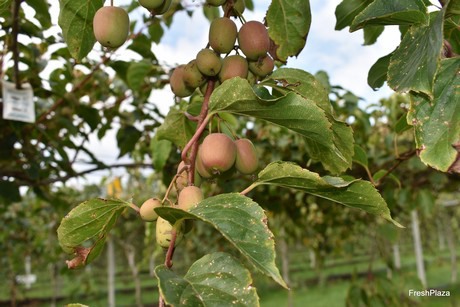
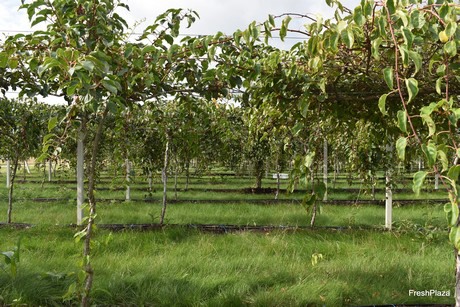 Left: A male plant, right: a female plant. Only the female plant ultimately bears fruit, the male variant is needed only for pollination.
Left: A male plant, right: a female plant. Only the female plant ultimately bears fruit, the male variant is needed only for pollination.
The cultivation and the marketing require a certain know-how, especially since the kiwi berries are to be harvested and sold within a few weeks. Overall, the campaign ultimately takes just under two months. Although culture is not particularly sensitive in itself, cultivation involves some difficulties. Due to the rapid growth, not all fruits on a plant are ripe at the same time. This requires a complex and accurate sorting. The fruits then come to the cold store for about 2 to 3 weeks, while the Brix content increases from just under 6 to more than 8 within 2-3 days. Dennis Weisbrod: "We are able to extend the cold chain with the help of a special storage, thus extending the season by a few weeks"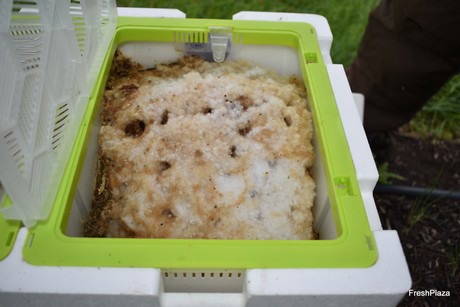 Pollination of the plants is done sustainably via bumblebees.
Pollination of the plants is done sustainably via bumblebees.
Sustainable cultivation
Only five years after planting, the plants are in the harvest. In total, a plant can be harvested for up to 10 years. "This year, the heat is very troublesome for us," says Weisbrod. From 2020 onwards, about 60% of the entire plantation will be covered with shading nets," says the operations manager.
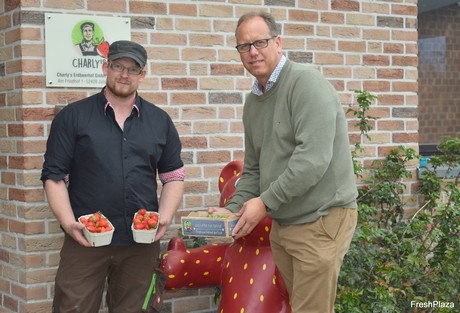
Producer meets marketer: Dennis Weisbrod (l) of Charly's Erdbeerhof and Andre Franken of Diplanya GmbH (formerly Marktvertrieb Dieter Schwerin GmbH). 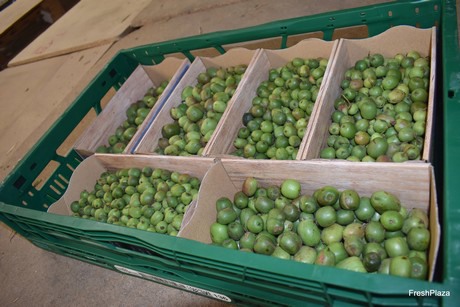 Packaged goods in cardboard trays.
Packaged goods in cardboard trays.
The cultivation is extremely sustainable, if possible without the use of pesticides. However, there is still little demand to market the berries as organic products, especially since the fruit (in itself right) is unique and the marketing is still in its infancy. "We work with insects and are in direct cooperation with local beekeepers. Otherwise, we largely do without fungal or insect control," says Dennis Weisbrod.
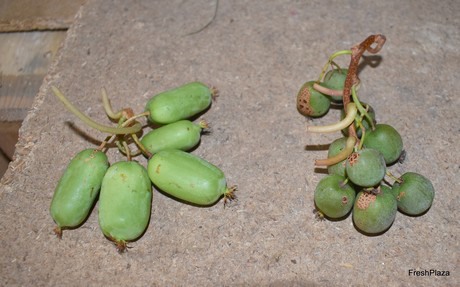
Left: The elongated fruits of the Waikiki variety, which are cultivated on a pilot plot in small quantities. Right: Over the years, the well-established and established Ananasnaja variety has acquired a high status within German food retailing. 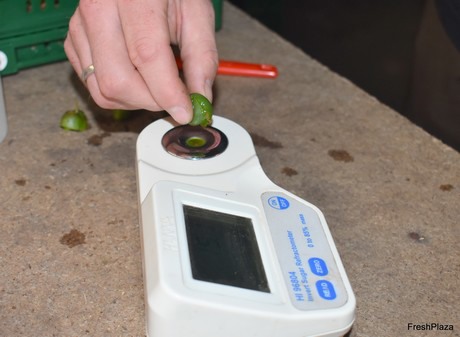 The Brix content of kiwi berries is checked on site.
The Brix content of kiwi berries is checked on site.
Direct marketing and further processing
Marketer and owner/operator Diplanya LLC has found a good sales channel for the Jülich products with its direct delivery to the German retail trade. Even at the producer level, however, the growing awareness of the product is noticeable, says Weisbrod. "Currently, the harvested goods are sold at 100%. Many people stop buy our farm to ask us if they can buy a bowl, fresh from the field. Therefore, we would like to take the step from 2020 to direct marketing."
For more information:
Charly’s Erdbeerhof GmbH & Co KG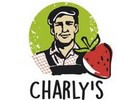
Am Friedhof 1
52428 Jülich-Broich
Tel: +49 (0) 2461 40674735
Fax: +49 (0) 2461 40674777
E-Mail: info@charlys-erdbeerhof.de
www.charlys-erdbeerhof.de
www.diplanya.com
